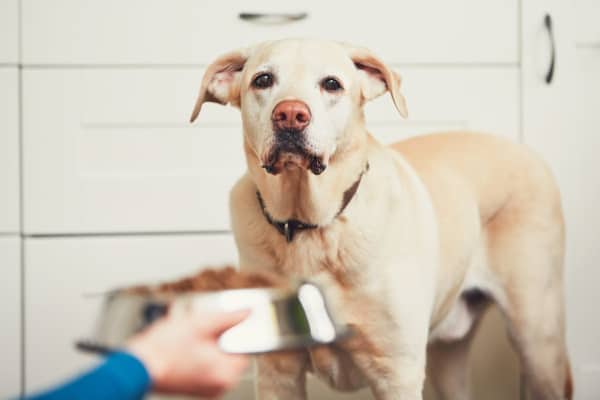It can be difficult to get older dogs to eat because they frequently decide they’re not that hungry anymore for a variety of reasons. If there are no other changes or symptoms of illness, a gradual decrease in appetite may simply be the result of aging-related metabolic slowing and decreased energy expenditure. This happens frequently because older dogs typically eat less.
But a variety of different health issues, either serious or minor, could also be to blame. Working with your veterinarian to rule out a health issue as the cause of the issue is crucial. In this manner, you can determine whether a dog’s decreased appetite is a result of the natural aging process or of health issues.
Dogs’ senses deteriorate with age, including their senses of sight, hearing, smell, and taste. They might also experience ongoing issues that affect their appetite but are not life-threatening. When a dog refuses to eat, the persistent malnutrition can cause weight loss, lethargy, and even dehydration, all of which can be fatal on their own.
Before going over nine suggestions to encourage your elderly dog to eat more, we’ll first discuss how health can affect your dog’s appetite.
Your dog’s appetite is a critical clue
This frustration is familiar to many dog owners: “Wouldn’t it have been great if Boss could have told me what was happening?”
But our dogs do give us clues.
Other clinical symptoms that accompany an older dog’s refusal to eat can guide dog owners and veterinarians in their investigation of the cause. When you think about your senior dog, take into account the following three situations and possible underlying conditions.
What else can you do to help a dog who’s not eating?
I am aware that you are concerned when your dog is not eating as a responsible pet owner. I make fun of our collective subconscious tracking of our pets’ daily intake of food, poop, and urine in front of my clients. We feel like we are failing them as their guardians if our dogs aren’t eating. In order to tempt a dog who isn’t eating to take a few bites, veterinarians advise using “tricks.” However, as was mentioned above, the focus must be on identifying the underlying reason for the loss of appetite.

Offering wet food or soaking the dry kibble in warm water can help your grey-muzzled companion eat if he is having trouble or just isn’t interested in his dry dog food. Food may be improved by adding chicken breast or lean ground beef (drained). Your veterinarian may occasionally advise you to feed your dog baby food items because they are simple to digest and come in a variety of tasty flavors. (Just be careful to keep products free of onion powder, which is poisonous to dogs.) Your veterinarian may suggest using a syringe to administer food to your dog in certain situations. Additionally, if your dog is recovering from a severe condition that required hospitalization, your veterinarian might suggest a feeding tube for use at home. Although it may seem difficult, your veterinarian will guide you through the process and address all of your concerns.
Your veterinarian may recommend an appetite stimulant like mirtazepine for a senior dog who needs a little assistance regaining an interest in food following an illness or because of deteriorating health. Mirtazepine, also referred to as Remeron, is a once-daily, low-cost medication that is secure and beneficial for my patients. Dogs benefit from it as an appetite stimulant even though it is prescribed for humans as an antidepressant. Entyce, a brand-new prescription medication for animals, is now a FDA-approved canine appetite stimulant.

Pick food that fits his own unique dietary needs:
Unfortunately, just because a dog food package says “Senior Formula” doesn’t mean that it will be what Fido needs. You must select a meal that satisfies his individual dietary requirements, more specifically his level of activity and general health. I suggest beginning by looking at this page, Senior Dog Nutrition, because it has all the details and suggestions you require to ensure that you’re giving your elderly dog the best food for him.
FAQ
Is it normal for older dogs to lose appetite?
Older dogs frequently have diminished appetites, according to Nunez. Causes vary. For instance, some dogs experience nausea due to gastrointestinal issues, while others experience appetite loss as a result of cancer.
At what age do dogs start eating less?
When you notice a sudden, and frequently significant, reduction in feeding quantities around 6 months of age, it’s not uncommon to become concerned because at this point you’re really focused on doing the right thing to help your puppy grow into a healthy adult dog.
Why is my dog eating less but acting normal?
Common Reasons For Loss Of Appetite In Dogs. The causes of dogs losing their appetite are numerous. This includes issues with the body, behavior, the environment, separation anxiety, and food-related issues.
Do older dogs appetite change with age?
Frequently Occurring Reasons for Reduced Appetite As dogs age, their bodies change As their senses of smell and taste deteriorate, they may develop different food preferences or feel less excited about meals.